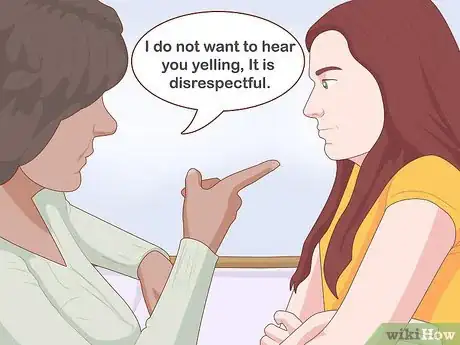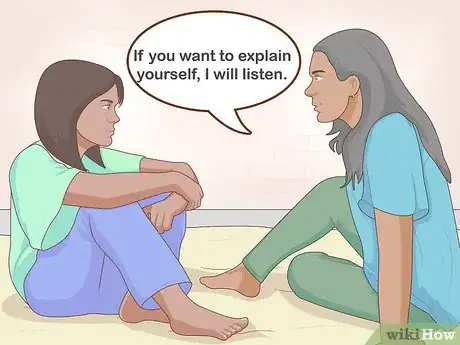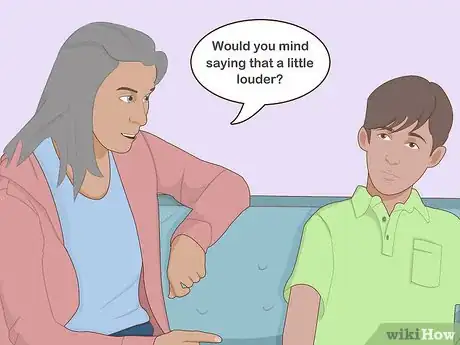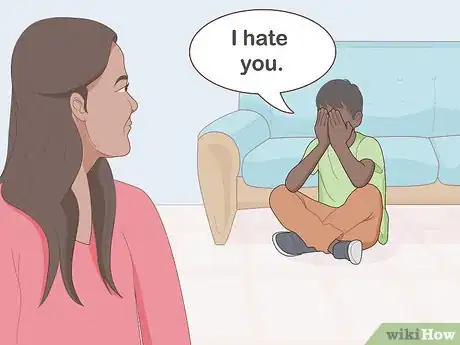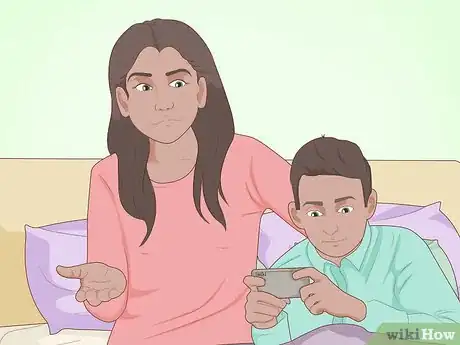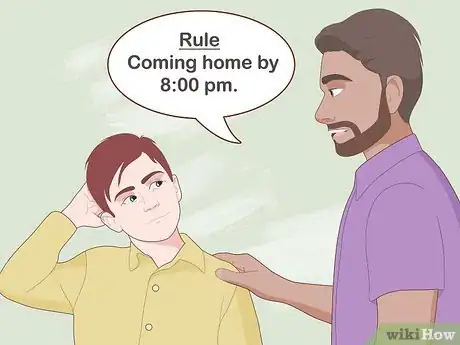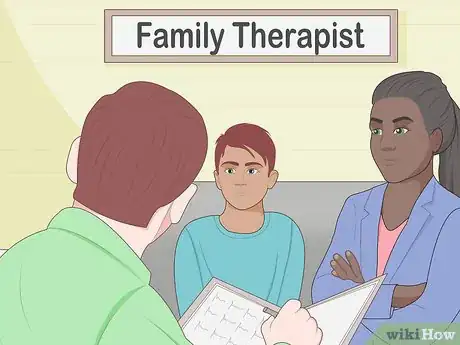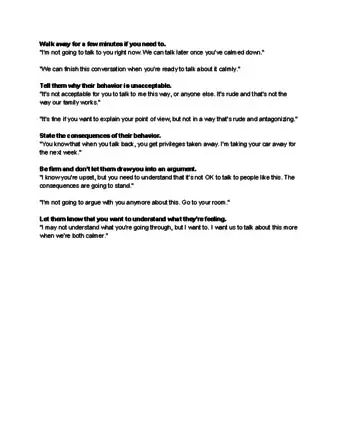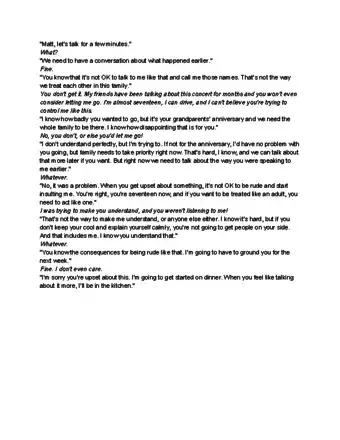This article was co-authored by Wits End Parenting. Wits End Parenting is a parent-coaching practice based in Berkeley, California specializing in strong-willed, “spirited” children with impulsivity, emotional volatility, difficulty “listening,” defiance, and aggression. Wits End Parenting's counselors incorporate positive discipline that is tailored to each child’s temperament while also providing long-term results, freeing parents from the need to continually re-invent their discipline strategies.
There are 10 references cited in this article, which can be found at the bottom of the page.
This article has been viewed 20,094 times.
Talking back is a natural part of being a teenager. Unfortunately, this behavior can be rude, disrespectful, and annoying to parents. To help your teenager understand proper behavior, make sure you respond to their comments in a calm but firm manner. Once they have calmed down, have a chat with them about what went wrong. If talking back is a consistent behavior, however, you may need to implement more long-term solutions.
Steps
Responding to the Backtalk
-
1Speak calmly yet firmly. Yelling, screaming, or shouting at your teen will only make them angrier. Act as a model for your teen to show them how to be calm during a conflict. Avoid raising your voice or insulting them.[1]
- If you find yourself so angry that you can’t stay calm, excuse yourself. Tell your teen, “I need a moment to collect my thoughts, but after that, we’re talking.” Take as much time as you need to calm down.
- Don’t curse, insult, shout, or use sarcasm as a response to your child. This may only result in a bigger argument.
-
2Ignore minor instances of talking back. Some teens may roll their eyes or mumble under their breath. While it may seem disrespectful, if there is no harm done, it may be better to ignore the behavior. It will help avoid a potentially disastrous argument.[2]
- For example, if you ask your teen to wash the dishes and they roll their eyes, you might ignore it as long as they actually do the task.
- If you refuse to let your teen go out, they may mumble something like "ugh, fine, whatever." In this case, you might just want to let it go.
Advertisement -
3Tell them that you won't tolerate swearing, insulting, and screaming. If your child is calling you names, using inappropriate language, or insulting you, you should tell them that this behavior is not appropriate. State assertively that there will be consequences for their actions. Be sure to explain why this behavior is wrong.[3]
- You might say, “I do not want to hear you swearing. It is disrespectful” or “If you want to talk to me, use a calm voice. Don’t yell.”
- You should also explain why the backtalk is inappropriate. For example, you might say, “I find it difficult for us to have a conversation when I am being interrupted.”
-
4Allow your teen to explain their perspective. If your teen consistently says things like “you don’t understand” or “you don’t get it,” perhaps they are struggling to communicate. Ask them to explain their point. Don’t interrupt the teen until they have finished talking.[4]
- You may say, “If you want to explain yourself, I will listen.”
- Your teenager may not understand why you are doing certain things. For example, they may believe that you are being mean when you won’t let them date. Explain your reasons for making this rule.
- Show your teen that you’re listening by repeating back what they say using statements. You might say, “I understand that you’re mad because you can’t go to the concert” or “What I am hearing is that you think your curfew is too strict.”
-
5Ask your teen to clarify or repeat their backtalk. To help emphasize that the comment or gesture was inappropriate, ask the teen to repeat what they said. You might ask them to say it in a nicer way or to explain what they meant. This can help your teen communicate in a more polite manner.[5]
- For example, if they were mumbling, you can say, “Would you mind saying that a little louder?”
- Ask them to reframe rude questions as polite ones. For example, you might say, “Can you ask for the computer in a more polite manner?”
-
6Explain the consequences to your teen. Tell your teen exactly what will happen if they talk back to you again. Give them 1 warning before enforcing the consequence.[6]
- You might say something like, “If I hear you talk to me like that again tonight, you don’t get to watch TV.”
- Another thing you might say is, "If you keep swearing like that, you will have to pay a dollar to the swear jar every time you curse."
-
7Walk away if the teen refuses to listen. If your teen is too emotional or if you are unable to behave calmly yourself, remove yourself from the situation. You and your teen can talk again when you have both calmed down.[7]
- You can say, “I’m not going to talk to you right now. We’ll talk later when you’ve calmed down.”
- Alternatively, if your teen walks away from the conversation, don’t follow them. Give them some time to cool down.
Dealing with the Aftermath
-
1Avoid taking the comments personally. Your teen might say something rash and extreme, such as “I hate you” or “You’re the worst parent in the world.” Understand that your teen doesn’t really think this. Remember that they’re young and going through an emotional part of their life.
- You might try to remember how you felt as a teenager. This can help you empathize with your teen.
-
2Talk to your teen once you've both calmed down. Once your teen has calmed down, approach them. Tell them that you want to talk about the situation earlier. Once again, be calm and firm as you speak.[8]
- You might say, "Are you feeling better? I want us to discuss what happened earlier."
-
3Tell your teen you haven’t changed your mind. Sometimes, teens will rebel to try to get you to change your mind. If they can sway you, they will think this tactic works. Tell your teen that while you’re sorry they’re upset, the rule stands. This will encourage them to find other ways to express their discontent.[9]
- You might say something like, "I know that you really wanted to go on that school trip, but my answer is still no."
- Refer back to your house rules if possible. For example, you might say, "I know you said you were sorry, but you know the rules. You're not supposed to swear in the house."
-
4Explain the appropriate way for your teen to ask for something. If your teen thinks you are being unfair or restrictive, encourage them to come to you calmly to ask for something. Tell them precisely what they must do if they want to see a change.[10]
- For example, you might say, “Next time, if you really want to hang out with your friends, do your homework first and then come ask me politely.”
- Alternatively, you might set conditions for a new rule. For example, you might say, "If you want me to extend your curfew, you'll have to show me that you can follow the current one. If you can do this for a whole month, I'll consider changing it."
-
5Enforce consequences appropriate for the misbehavior. It is up to you whether or not you discipline your teenager for talking back. If you do, however, make sure that it is appropriate for the situation. Don’t impose too severe consequences for talking back.[11]
- For example, if your teen is playing a video game and talks back when you are trying to have a conversation with them, you could forbid them from playing games for a day or 2.
- If your teen is swearing or using abusive language towards you, consider grounding them for a week.
Enforcing Positive Behavior
-
1Establish clear and consistent rules. It can be hard for your teenager to act appropriately when they don’t know what is expected of them. Talk to them about the house rules. Make sure they are aware of the consequences.[12]
- Have periodic chats with your teenager about the house rules. If they have shown responsibility or mature decisions recently, consider relaxing the rules to give them more independence.
- Don’t enforce the same rules on a teenager that you did when they were children. For example, if their curfew was sunset as a 10-year old, you may want to change it to 8 pm for a 13-year old or 10 pm for a 16-year old.
-
2Praise your teen when they speak in a respectful or mature way. If your teen compliments you, offers to help out around the house, or asks for something in a respectful way, let them know that they did well. Explain exactly what they did right.
- For example, you might say, “Thank you for asking me before dyeing your hair. It’s a good idea to get other people’s opinions before going through with such a big change.”
- Alternatively, you might say, “I’m glad you called me instead of trying to walk home alone. I will always come and get you if you’re stuck at night.”
-
3Talk to your teen to determine if stress or anxiety is causing their behavior. School, relationships, and other growing pains can affect your teenager’s mood and cause them to snap at you. Check in with your teenager every day to make sure that there are no underlying problems causing this behavior.
- A good way to do this is to set aside time everyday to talk with your teen. Tell your teen that they can talk about anything and you will listen. Try not to interrupt them as they talk. Listening can help build trust between you and your teen. It will also encourage them to come to you with their problems.
- Whenever your teen comes to you and asks for help without resorting to backtalk, help them solve their problems.
-
4Seek family counseling if the problem becomes too severe to handle. If your child’s talking back continuously causes arguments or increases tension in the family, it may be time to see a professional. A family therapist can provide sessions for the whole family as well as individual sessions for you or your teen.[13]
Conversation Help
Expert Q&A
-
QuestionHow do you discipline a defiant teenager?
 Wits End ParentingWits End Parenting is a parent-coaching practice based in Berkeley, California specializing in strong-willed, “spirited” children with impulsivity, emotional volatility, difficulty “listening,” defiance, and aggression. Wits End Parenting's counselors incorporate positive discipline that is tailored to each child’s temperament while also providing long-term results, freeing parents from the need to continually re-invent their discipline strategies.
Wits End ParentingWits End Parenting is a parent-coaching practice based in Berkeley, California specializing in strong-willed, “spirited” children with impulsivity, emotional volatility, difficulty “listening,” defiance, and aggression. Wits End Parenting's counselors incorporate positive discipline that is tailored to each child’s temperament while also providing long-term results, freeing parents from the need to continually re-invent their discipline strategies.
Parenting Specialists Being a patient, loving parent doesn't mean you should put up with defiance, disrespect, or physical aggression. You have to have an effective discipline and boundary-setting system; otherwise, it's easy to get overwhelmed by problems.
Being a patient, loving parent doesn't mean you should put up with defiance, disrespect, or physical aggression. You have to have an effective discipline and boundary-setting system; otherwise, it's easy to get overwhelmed by problems.
References
- ↑ https://www.verywellfamily.com/disrespectful-back-talk-teen-2609130
- ↑ https://www.verywellfamily.com/disrespectful-back-talk-teen-2609130
- ↑ https://www2.cortland.edu/dotAsset/1b1764f4-968a-4f29-b506-01257a542b39.pdf
- ↑ https://www.caringforkids.cps.ca/handouts/talk_with_your_teen
- ↑ https://www.goodhousekeeping.com/life/parenting/tips/a17865/teenage-discipline/
- ↑ https://www.verywellfamily.com/disrespectful-back-talk-teen-2609130
- ↑ https://www.caringforkids.cps.ca/handouts/talk_with_your_teen/
- ↑ https://www.verywellfamily.com/disrespectful-back-talk-teen-2609130
- ↑ https://www.verywellfamily.com/disrespectful-back-talk-teen-2609130


